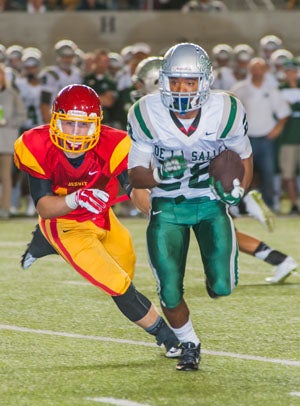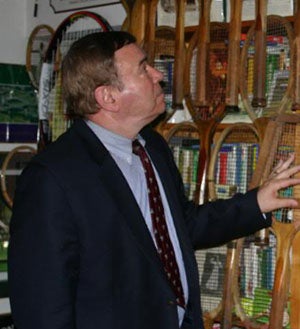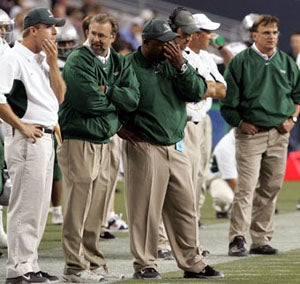For the last 335 De La Salle (Concord, Calif.) football games, Dr. David Flakoll has gladly and meticulously served as the program's historian and videographer.
When the Game Stands Tall: Now on Blu-rayTM Combo Pack and Digital HD!
Antoine Custer is the current wave of De
La Salle excellence.
File photo by Dennis Lee
Through a very focused and skilled lens, he has transcribed every play, touchdown and victory for the last 23 seasons — the team has lost only 13 during that time — then edited into season-long highlight DVDs that he gives to each player and coach at the team banquet.
"He's a staple of De La Salle football," said Terry Eidson, the team's defensive coordinator the last 33 years.
Combine that with the fact that Flakoll has been a clinical psychologist since 1972, with an emphasis on sports psychology and peak performance, and the 72-year-old is one of the most qualified experts to determine what has made the Spartans stand so tall for the last three decades.
"The physical side of De La Salle is obviously very, very important," he said. "They've had great talent and receive tremendous physical conditioning.
"But the real force that makes De La Salle so special in my mind is the mental aspect."
The force of De La Salle and Flakoll's insights are significant now not only because De La Salle is performing at such a high level once again — the Spartans are 12-0, have outscored foes 644-140 and are No. 3 in the MaxPreps Xcellent 25 National Football Rankings presented by the Army National Guard — but this month marks the release of "When the Game Stands Tall" on DVD and Blu-ray.
Many of Flakoll's clips roll during the movie's credits, which brings great pride and satisfaction. His work and dedication over close to a quarter century, much like the Spartans', had been validated on the silver screen.
"It's been an incredible act of God this all came to fruition," he said. "The whole De La Salle experience for me has been amazing."
Flakoll, whose son David was the Most Valuable Lineman on the 1992 team — the one that started the program's 151-game win streak — spent most of his professional life prior to 1989 focused on tennis, a game he picked up himself to combat the sedentary office life of psychiatry.
Like all endeavors, Flakoll dove head first into the sport, and his name soon became well known among the United State Tennis Association world. Four rooms in his Alamo, Calif., home are shrines to the grand slams of professional tennis: Wimbledon, The Australian Open, The French Open and U.S. Open. Dozens of racquets (he has collected more than 4,200 in his lifetime) and keepsakes fill each wall of each room.

Dr. David Flakoll with his hundreds of vintage
tennis racquets.
Courtesy photo
Many of his clients were tennis pros and aspiring professionals and his Sports Psychology Institute "emphasized ideal performance and mental skills," while dealing with depression and low self-esteem among athletes.
His focus changed to De La Salle when David, slated to attend public school at nearby Las Lomas High, decided he wanted to be a Spartan.
Flakoll, not a huge football fan at the time, started taping freshmen games, and then worked a varsity game and got totally hooked while following a sophomore wide receiver with the camera.
"Amani Toomer," Flakoll said. "What an athlete. What an amazing football player. … I started taping all the varsity games soon after and I haven't stopped since."
Flakoll got enamored first on the skill and excitement of De La Salle football, but then became entrenched because of the program's "deeper dynamics," involving perfect effort, goal setting and spiritual bonding — all at the heart of "When the Game Stands Tall."
Besides his tennis shrines, there is now a "Spartan Room" in his home filled with storage boxes going back to 1989, filled with annual press clippings and video tapes.
He has also archived a large collection of high school football games televised via satellite and cable throughout the years. Before the advent of Hudl and easy tape exchange, Flakoll proved a great resource to the coaching staff when needing game footage from teams throughout the country.
"He is the history of De La Salle football," Eidson said. "He's been an invaluable resource, friend and supporter to our program. We're so thankful."
Here are 10 questions and answers for and from Flakoll, the clinical sports psychiatrist, on why De La Salle football has stood so tall so long.
Q. Let's get right to it. What makes De La Salle football so special from your perspective?"It starts with challenging the players to a high level of performance, a peak performance. The coaches help get them there through a great sense of bonding and mutuality. There is a vision and care and mutual commitment to the perfect effort that is very powerful."

Edwardo Lopez was a 1,000-yard rusher for
De La Salle in 2004.
File photo by Richard Rector
"I recall after the 1991 season, after losing to Pittsburg at the Oakland Coliseum, coach (Bob) Ladouceur made an even more concerted effort to build that inner community and team chemistry. A lot of juniors on that team including my son and Patrick Walsh and several other leaders had a tremendous resolve to come together as a team. And 1992 was pretty special."
Q. Is that when you started making highlight tapes for the kids? "Yes. That was the year Cal-Hi Sports picked us as the state Team of the Year. I recall Chick Walsh (Patrick's father) saying it would be a good idea if we had highlights to watch at the banquet. I picked out 10 to 12 plays each game and it was a big hit. … I made an 18-minute video for the banquet and expanded it to 30 minutes for the whole season that I passed on to the players and coaches."
Q. What kind of things did your son and others take away from the program? "I just think there's a great development of selflessness and purpose, and a sense of responsibility and commitment and working together. Playing in this program allows so many young people to contribute and achieve and assist one another in so many ways. It's tremendous. It's just a huge learning opportunity in so many dimensions of life. These young people aren't just learning football."
Q. Why does Ladouceur identify so well with this age group? "There are many deeper dynamics going on inside Bob. He's always had such a care and concern for young people, back to his days working in probation. He's a very strong and caring person. He has an unyielding commitment to youth to help them move to a better place in life. I think that's been the key to the entire staff. They have an ability to inspire. But Bob is truly a very genuine and powerful person. That and his ego is very much secondary."
Q. Your highlight films are generally – not by coincidence – the highlight of the year-end banquets. That's saying something considering there have been some pretty keen speakers. Who have some of them been? "You're right. There's been some great speakers such as Tony LaRussa, Ronnie Lott, Bill Walsh, Carmen Policy, Steve Largent, John Madden, John Ralston, Ken Hoffman, Brent Jones, and former Spartans like Maurice Jones-Drew, Amani Toomer and Aaron Taylor. That's a pretty impressive list."

The De La Salle coaching staff was shell-shocked
during the first half of its loss to Bellevue in 2004.
File photo by Richard Rector
"I have a great deal of admiration for that 2004 team. None of the other teams I've witnessed experienced more adversity and challenges. They suffered through coach Ladouceur's heart attack scare and then the murder of Terrance Kelly. Those were real life losses and not easy to heal from. To go through that a week or two before going to Washington was just too much."
Q. What do you remember about Seattle and Bellevue? "I don't think anyone realized – not even the coaching staff – just how formidable an opponent Bellevue was. I mean that team was truly prepared. Considering the emotional trauma the team was going through, they weren't ready to deal with a formidable opponent like that."
Q. But they eventually responded very well, yes? "Yes. It wasn't instant, but week-by-week they gained momentum. Actually they played very well against Mark Sanchez and Mission Viejo. Even though they lost 17-14 it was more of an internal victory. They became more confident and determined. They rose up and played De La Salle football the rest of the season.
Q. What do you remember about shooting the North Coast Section title game that year against Amador Valley at Cal? "It was a beautiful day and I remember the flag in the stands being waved for Terrance Kelly. I remember the defense playing with such passion and making a couple of goal-line stands. When the Spartans won 41-0 against an undefeated team, Ladouceur said a De La Salle team had never come so far in a season. I think he was right."
